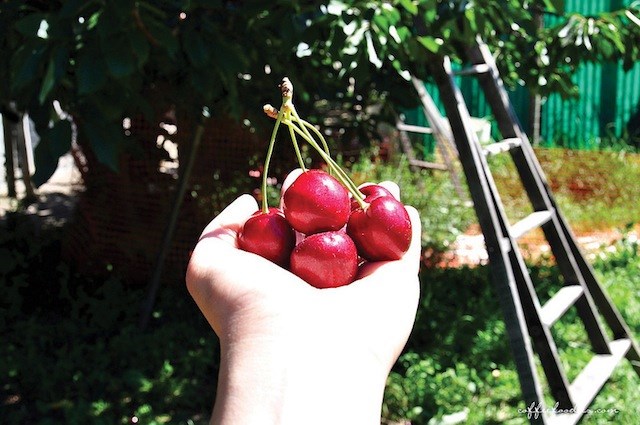Plums, pears, apples, cherries and berries are ripe for the taking right now, throughout the city, but often overlooked by most Richmond residents.
The Richmond Food Security Society helps harvest some of these lonely fruits but needs more volunteers, said director Colin Dring.
"We can always use more pickers.
"You get a nice little supply of local, organic fruit," by picking what are known in the food security circles as "urban edibles," said Dring.
This summer, as in past summers over the last decade, the society has been organizing volunteers to pick the choicest, fruity urban edibles for the Richmond Food Bank.
New to this year's fruit-picking challenge (a series of picking events), volunteers are collecting dropped fruit and using them to make jams and meals with the support of other non-profit community groups.
In the last five years the society and its volunteers have picked over 12,000 pounds of fruit for the food bank. The numbers vary year-to-year depending on how many volunteers participate. The venture peaked in 2009 when 5,720 pounds of fruit was harvested from 42 picks.
This year the society has harvested 350 pounds of plums, said the society's fruit picking coordinator Samein Shamsher.
"It's been going well. So far we've done plums and blueberries and now we'll be doing apples," said Shamsher.
The society currently draws on a core of about 100 volunteers and at each picking event about five volunteers will come out to help.
Residents register their fruit trees and bushes with the society ahead of time.
Dring said development has lessened the availability of fruit in the city.
"We've noticed as development is hitting Richmond, a lot of fruit trees are being taken down so that's something that will happen throughout the city," said Dring.
He said fruit trees are easily maintainable.
"They're beautiful tress. A lot of people think you need to get big ones but you can get (dwarf trees) that typically grow to a maximum of 8-10 feet, and they're really easy to pick," he noted, adding that the trees require more care in the first few years of growth.
"It's just a question of establishing them," said Dring.
Socially progressive European cities are known to have urban orchards and nearby Seattle has a city park dedicated to growing fruit, which has facilitated community engagement. Vancouver has the Vancouver Fruit Tree Project and maps urban edibles at fallingfruit.com.
City spokesperson TedTownsend noted a small orchard will be planted south of Branscombe House in Steveston. Three other parks have fruit trees, which the city maintains (Paulik, London Farm, Terra Nova).
Common problems associated with urban fruit, if left unattended, are maintenance, messy droppings and rodents.
Townsend said pruning would increase seven fold for fruit trees over the existing ones it plants along streets. He said chemical sprays are not allowed on city property, which could hamper productivity.
When asked if the City of Richmond could adopt more edible landscapes, Dring said it could do so easily, but it's ultimately a matter of political and community will power.
"It's not a concern that can't be mitigated through the community or say the public works," said Dring.
"Certainly they (public works) are ripping out marigolds every three weeks or so," he added.
The society maps potential "food assets" on its website.
If you have accessible fruit growing on your property that is in good condition you can register to have it picked by calling the society at 604-244-7377.



